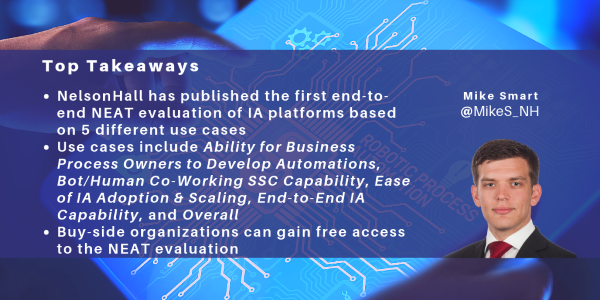Search posts by keywords:
Filter posts by author:
Related Reports
Related NEAT Reports
Other blog posts
posted on Sep 03, 2019 by Mike Smart

NelsonHall has just launched an industry-first evaluation of Intelligent Automation (IA) platforms, including platforms from Antworks, Automation Anywhere, Blue Prism, Datamatics, IPsoft, Jacada, Kofax, Kryon, Redwood, Softomotive, and UiPath.
As RPA and artificial intelligence converge to address more sophisticated use cases, we at NelsonHall feel it is now time for an evaluation of IA platforms on an end-to-end basis and based on the use cases to which IA platforms will typically be applied. Accordingly, NelsonHall has evaluated IA platforms against five use cases:
- Ability for Business Process Owners to Develop Automations
- Bot/Human Co-Working SSC Capability
- Ease of IA Adoption & Scaling
- End-to-End IA Capability
- Overall.
Ability for Business Process Owners to Develop Automations – as organizations move to a ‘bot for every worker’, platforms must support the business process owners in developing automations rather than select individuals as part of an automation CoE. Capabilities that support business process owners in developing an automation include a strong bot development canvas, a well-populated app/bot store, and process discovery functionality, all in support of speed of implementation.
Bot/Human Co-Working SSC Capability – in addition to traditional unassisted back-office automation and assisted individual automations, bots are increasingly required to provide end-to-end support for large-scale SSC and contact center automation. This increasingly requires bot/human rather than human/bot co-working, with the bot taking the lead in processing SSC transactions, queries and requests. The key capabilities here include conversational intelligence, ability to handle unidentified exceptions, and seamless integration of RPA and machine learning.
End-to-End IA Capability – the ability for a platform to support an automation spanning an end-to-end process, leveraging ML and artificial intelligence, either through native technologies or through partnerships. While many IA implementations remain highly RPA-centric, it is critical for organizations to begin to leverage a wider range of IA technologies if they are to address unstructured document processing and begin to incorporate self-learning in support of exception handling. Key capabilities here include computer vision/NLP, ability to handle unidentified exceptions, and seamless integration of RPA and machine learning in support of accurate document/data capture, reduced error rates, and improved transparency & auditability of operations.
Ease of IA Adoption & Scaling – the ability for organizations to roll out automations at scale. Key criteria here include the ability to leverage the cloud delivery of the IA platform and the strength of the bot orchestration/management platform.
Overall – a composite perspective of the strength of the IA platforms across capabilities, delivery options, and the benefits provided to clients.
No single platform is the most appropriate across all these use cases, and the pattern of capability varies considerably by use case. And this area is ill-understood, even by the vendors operating in this market, with companies that NelsonHall has identified as leaders unknown even to some of their peers. However, the NelsonHall Evaluation & Assessment Tool (NEAT) for IA platforms enables organizations to see the relative strengths and capabilities of platform vendors for all the use cases described above in a series of quadrant charts.
If you are a buy-side organization, you can view these charts, and even generate your own charts based on criteria that are important to you, FREE-OF-CHARGE at NelsonHall Intelligent Automation Platform evaluation.
The full project, including comprehensive profiles of each vendor and platform, is also available from NelsonHall by contacting either Guy Saunders or Simon Rodd.
